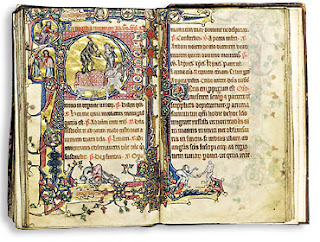Marco Polo described the city of Balkh in what is now northern Afghanistan as a "noble and great city and a seat of learning"—this despite its destruction 50 years earlier by Genghis Khan. Since the mid-8th century, Balkh had been a center for Persian-Islamic culture, drawing scholars and theologians from near and far. One of them was a theologian, jurist and mystic named Bahā ud-Dīn Walad, the latest of several generations of jurists, who was also known later as Sultan al-Ulama, "Sultan of the Scholars."
Bahā ud-Dīn Walad fled Balkh at the approach of the Mongols, taking his family westward until finally reaching an area that had been under the control of the Eastern Roman Empire and was still called Rûm. There he became head of a madrassa, which upon his death was inherited by his son, Jalāl ad-Dīn Muhammad Balkhī. Because the son lived in Rûm, however, he is usually known today as Rumi.
Rumi started in his father's footsteps as a jurist; he preached and issued fatwas.* A meeting with the dervish Shams-e Tabrizi inspired him to become an ascetic; when Shams disappeared (or was murdered; sources disagree) a few years later, Rumi was devastated. His emotions found expression in poetry. Once he started writing, he didn't stop; the Mathnawi has been called his greatest poetic work.
Although a devout Muslim (his poetry includes hundreds of lines from the Quran), his work is considered to have universal appeal. According to the BBC:
His poetry has an evolutionary strain, in that he saw a progression in the universal soul working through levels of existence. The Muslim philosopher Al Farabi introduced this idea to Islam, and it finds expression in Rumi in lines like:
With his injunctions of tolerance and love, he has universal appeal, says Abdul Qadir Misbah, a culture specialist in the Balkh provincial government.
"Whether a person is from East or West, he can feel the roar of Rumi," he says.
"When a religious scholar reads the Mathnawi, he interprets it religiously. And when sociologists study it, they say how powerful a sociologist Rumi was. When people in the West study it, they see that it's full of emotions of humanity."[source]
The madrassa where Rumi taught
I died as a mineral and became a plant,Rumi's poetry has inspired much of classical Iranian and Afghan music, and has been translated into languages all over the world. Madonna, Goldie Hawn, Philip Glass and Demi Moore have done performances of his poetry.
I died as plant and rose to animal,
I died as animal and I was Man.
Why should I fear? When was I less by dying?
Yet once more I shall die as Man, to soar
With angels bless'd; but even from angelhood
I must pass on: all except God doth perish.
When I have sacrificed my angel-soul,
I shall become what no mind e'er conceived.
Oh, let me not exist! for Non-existence
Proclaims in organ tones,
To Him we shall return.
As for Rumi in his country of origin: the Taliban outlawed music, and Sufism didn't fit their view of Islam. Since their ouster from political power in Afghanistan, Rumi has had a resurgence.
*Although in the West fatwas have a bad name, they are treated differently in the Sunni and Shia sects. Rumi was Sunni, and so his fatwas were non-binding.






























